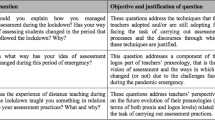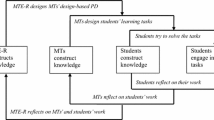Abstract
Many developing countries face challenges with unqualified mathematics teachers which education authorities have tried to address using available resources. In this chapter, we explore perspectives of in-service mathematics teachers about the challenges of the learning environment of a professional development programme. The data was generated through a questionnaire and semi-structured interviews. Thirty-five participants responded to the questionnaire and ten participants were interviewed. The analysis was carried out using an activity systems approach. The results showed that the teachers, although grateful for the upgrading opportunities, found the experience very stressful. It was reported that the programme prioritised the completion of the qualification above the development of conceptual understanding of the concepts. It is recommended that professional development programmes should be planned around the teachers’ needs and implemented in a manner that suits their circumstances.
Access this chapter
Tax calculation will be finalised at checkout
Purchases are for personal use only
Similar content being viewed by others
References
Avalos, B. (2011). Teacher professional development in Teaching and Teacher Education over ten years. Teaching and Teacher Education, 27(2011), 10–20.
Bachan, P. (2017). Relations among official, enacted and assessed dimensions of the Mathematics curriculum in public adult learning centre in KwaZulu-Natal. Master’s thesis, University of KwaZulu-Natal, South Africa.
Ball, D. L., Thames, M. H., & Phelps, G. C. (2008). Content knowledge for teaching: What makes it special? Journal of Teacher Education, 59(5), 389–407.
Bansilal, S. (2015). Examining success rates of teacher students: An activity theory analysis. Progressio, 37(1), 134–153.
Brown, D., Pryzwansky, W. B., & Schulte, A. C. (2001). Psychological consultation: Introduction to theory and practice. Alyn and Bacon.
Chapman, O. (2002). Belief structure and in-service high school mathematics teacher growth. In G. C. Leder, E. Pehkonen, & G. Törner (Eds.), Beliefs: A hidden variable in mathematics education? Springer.
Engstrom, Y. (1987). Learning by expansion: An activity-theoretical approach to development research. Orienta-Konsultit.
Engstrom, Y. (2001). Expansive learning at work: Toward an activity theoretical reconceptualization. Journal of Education and Work, 14(1), 133–156.
Gadebe, T. (2005). New curriculum focuses on Africa. Bua News. http://www.southafrica.info/about/education/curriculum-190705.htm#.VG2fom8eZQ
Gore, J., Lloyd, A., Smith, M., Bowe, J., & Ellis, H. (2017). Effects of professional development on the quality of teaching: Results from a randomised controlled trial of quality teaching rounds. Teaching and Teacher Education, 68(2017), 99–113.
Granser, T. (2000). An ambitious vision of professional development for teachers. NASSP Bulletin, 84(618), 6–12.
Guba, E. G., & Lincoln, Y. S. (2005). Paradigmatic controversies, contradictions, and emerging confluences. In N. K. Denzin & Y. S. Lincoln (Eds.), The Sage handbook of qualitative research (3rd ed., pp. 191–215). Sage.
Gwekwerere, Y. N., Mushayikwa, E., & Manokore, V. (2013). Empowering teachers to become change agents through science education in-service training project in Zimbabwe. Canadian and International Education, 42(2), 1–16.
Kanyango, Y. G. (2005). Zimbabwe’s public education system reforms: Successes and challenges. International Education Journal, 6(1), 65–74.
Kazunga, C., & Bansilal, S. (2017). Zimbabwean in-service mathematics teachers’ understanding of matrix operations. The Journal of Mathematical Behavior, 47, 81–95. https://doi.org/10.1016/j.jmathb.2017.05.003
Kazunga, C., & Bansilal, S. (2018). Misconceptions about determinants. In S. Stewart, C. Andrews-Larson, A. Berman, & M. Zandieh (Eds.), Challenges and strategies in teaching linear algebra (pp. 127–145). https://doi.org/10.1007/978-3-319-66811-6_6
Kazunga, C., & Bansilal, S. (2020). An APOS analysis of the understanding of solving systems of equations using the inverse matrix method. Educational Studies in Mathematics, 103, 339–358. https://doi.org/10.1007/s10649-020-09935-6
Kelleher, J. (2003). A model for assessment-driven professional development. Phi Delta Kappan, 84, 751–756.
Leu, E. (2004). The patterns and purposes of school-based and cluster teacher professional development programs. USAID.
Mushayikwa, E., & Lubben, F. (2009). Self-directed professional development – Hope for teachers working in deprived environments. Teaching and Teacher Education, 25(2009), 375–385.
Ndlovu, Z., & Brijlall, D. (2015). Pre-service participants’ mental constructions of concepts in matrix algebra. African Journal of Research in Mathematics, Science and Technology Education, 19(2), 156–171.
Ozdag, H., & Aygor, N. (2012). Undergraduate students’ performances in linear algebra: Factorization of a determinant of n* n dimensional matrices. Procedia-Social and Behavioral Sciences, 46, 125–129.
Plaxco, D., & Wawro, M. (2015). Analyzing student understanding in linear algebra through mathematical activity. The Journal of Mathematical Behavior, 38, 87–100.
Schwille, J., & Dembele, M. (2007). Global perspectives on teacher learning: Improving policy and practice. UNESCO International Institute for Educational Planning.
Sheckle, L. (2014). An activity theory analysis: Reasons for undergraduate students’ absenteeism. South African Journal of Higher Education, 28(2), 605–623.
Slavich, G. M., & Zimbardo, P. G. (2012). Transformational teaching: Theoretical underpinnings, basic principles, and core methods. Educational psychology review, 24(4), 569–608.
Steyn, G. M. (2008). Continuing professional development for teachers in South Africa and social learning systems: Conflicting conceptual frameworks learning. Koers, 73(1), 15–31.
Vonk, J. H. S. (Ed.). (2011). Becoming a teacher: Brace yourself. Institute Education.
Wadesango, N., Dhliwayo, J., & Machingambi, S. (2012). The effect of staff development on pedagogical practices of mathematics teachers in Gokwe South District in Zimbabwe. Journal of Social Science, 30(3), 235–242.
Wu, F. (1999). Notices of the AMS. Professional Development of Mathematics Teachers, 46(5), 535–542.
Zaslavsky, O., & Leikin, R. (2004). Professional development of mathematics teacher educators: Growth through practice. Journal of Mathematics Teacher Education, 7, 5–32.
Author information
Authors and Affiliations
Corresponding author
Editor information
Editors and Affiliations
Rights and permissions
Copyright information
© 2021 The Author(s), under exclusive license to Springer Nature Switzerland AG
About this chapter
Cite this chapter
Kazunga, C., Bansilal, S. (2021). The Challenges of Upgrading Mathematics Teachers’ Qualifications: A Case Study from Zimbabwe. In: Luneta, K. (eds) Mathematics Teaching and Professional Learning in sub-Sahara Africa. Research in Mathematics Education. Springer, Cham. https://doi.org/10.1007/978-3-030-82723-6_13
Download citation
DOI: https://doi.org/10.1007/978-3-030-82723-6_13
Published:
Publisher Name: Springer, Cham
Print ISBN: 978-3-030-82722-9
Online ISBN: 978-3-030-82723-6
eBook Packages: EducationEducation (R0)




